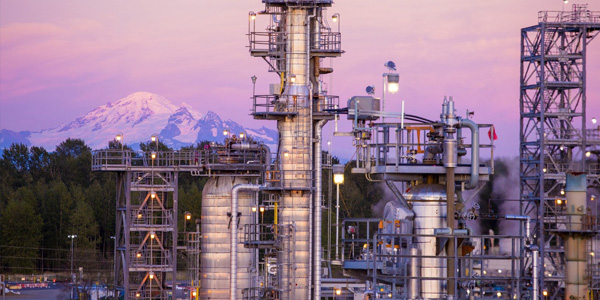A bill to trim carbon emissions from motor vehicles appears headed to the full Washington House of Representatives for a floor vote.
“I definitely feel this has a good chance of passing,” said state Rep. Joe Fitzgibbon (D), chairman of the House Environment and Energy Committee and the sponsor of House Bill 1091.
Bill opponent Rep. Mary Dye, ranking Republican on that committee, said because the pandemic prevents legislators from eating and mingling together, it is difficult to get a grasp of the bill’s chances of passage.
If passed, the bill would mandate that carbon emissions from gasoline and diesel fuel sold in Washington be cut by 10% below 2017 levels by 2028 and by 20% by 2035. It excludes emissions from fuel that is exported out of state or used by water vessels, railroad locomotives and aircraft. The goals apply to overall vehicle emissions in the state and not to individual types of fuels; Northwestern Washington has five oil refineries. It would go into effect Jan. 1, 2023.
On Jan. 21, the House Energy committee recommended passing the bill 7-5, with one abstention, along party lines. Rep. Sharon Shewmake (D), whose swing district holds most of the refineries, abstained. The bill is currently awaiting a vote in the House Appropriations Committee before going to the full House and then the Senate — both controlled by Democrats. Gov. Jay Inslee, who requested the bill be introduced, will likely sign it.
Nearly 1,500 people signed up to testify against the bill at a hearing Thursday before the Appropriations Committee, compared to about 600 people in favor. Only a tiny fraction actually testified.
“It’s a costly and ineffectual mandate,” Jessica Spiegel, Northwest regional director of the Western States Petroleum Association, said at a hearing before the committee in January. Port of Seattle Commissioner Fred Felleman, countered: “It’ll be good for the economy.”
The bill builds on a 2008 law that directed the state to reduce its overall CO2 emissions to 90.5 million metric tons, the level in 1990, by 2020.
A recent Washington Department of Ecology report shows that the state’s CO2 emissions dropped to 91.2 million metric tons by 2012 before growing back to 95.7 million metric tons in 2017 and 99.57 million metric tons in 2018. The 2020 level has not yet been calculated.
In an email, Andrew Wineke, the department’s spokesperson, said the state government expects carbon emissions to shrink in 2020 because of the COVID-19 pandemic. In addition, the state stopped consuming power from Montana’s Colstrip coal-fired power plant at the beginning of last year. Washington has one coal-fired power plant, operated by TransAlta, in Centralia. Under a carbon-reduction agreement with the state, TransAlta closed one unit at the 1,340-MW plant in December 2020 and plans to close the other in 2025.
The same 2008 law sets carbon-reduction targets of 45% below 1990 levels by 2030, 70% by 2040 and 95% by 2050.
Fitzgibbon said 42% of Washington’s carbon emissions comes from motor vehicles.
A major issue for those against the bill is how much decarbonized motor fuel will cost at the pump.
Mike Ennis of the Association of Washington Business argued that decarbonization will add 20 to 60 cents/gallon to gasoline prices. Dan Coyne, representing using Food Northwest, a coalition of food processors and their suppliers, cited a figure of 57 cents.
In contrast, Stu Clark, special assistant in Ecology Department, said California’s fuel decarbonization efforts resulted in a 1% increase in gas prices, while Oregon’s efforts resulted in a 2% change. “There will be a cost impact,” he argued.
‘A Tax on Everything We Do’
HB 1091 would require the Ecology Department to hire an independent consultant by Dec. 1 to create a publicly available forecast of costs or savings under the law beginning in 2025.
Opponents of the bill testified that claims of improving air quality are exaggerated, saying it would cost jobs and send business out of the state. They also contended that proposed standards would hit poor people hard and cause the trucking industry to add surcharges to shipments. Some said low-carbon fuels should be included in the legislature’s upcoming package of bills and appropriations addressing transportation and not be addressed separately.
Rep. Dye said a gasoline tax increase is likely in the transportation package of bills, and fuel cost increases would be an extra burden on drivers.
“The low-carbon standard is a tax on everything we do,” Yakima County farmer Frank Lyall said.
Proponents argued that carbon pollution has harmful health effects and disproportionately affects low-income communities as well. They added that there is great potential in Washington to grow the low-carbon fuels industry and that a clean fuels program should try to include rebates to buyers of electric vehicles.
Jay Manning, representing the environmental organization Puget Sound Partnership, noted that carbon emissions have been linked to the increased acidification of waters in Puget Sound and off the Washington and Oregon coasts, harming the struggling orca population. Reviving three struggling orca pods has been a popular and high-profile effort in Washington.
While the Western States Petroleum Association opposes the bill, BP is more neutral.
Tom Wolf, BP’s external affairs director, testified that his company agrees with the state’s goal of trying to reach zero emissions by 2050, believing that target will ultimately be beneficial to the company’s shareholders. However, he asked for caps on fuel prices if decarbonization increases those costs.
“We’ll respond to the market, and I think the other companies will do as well,” Wolf said.




